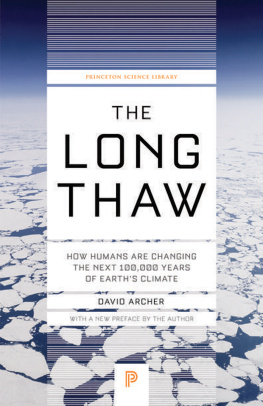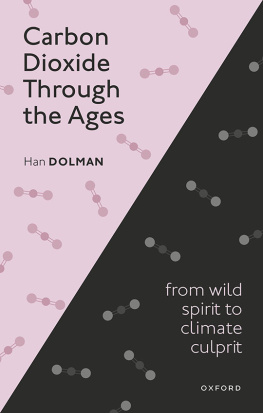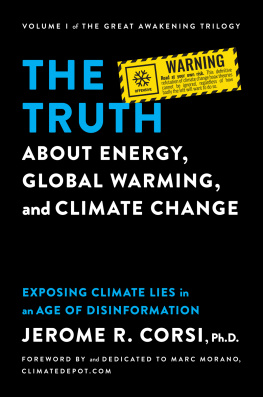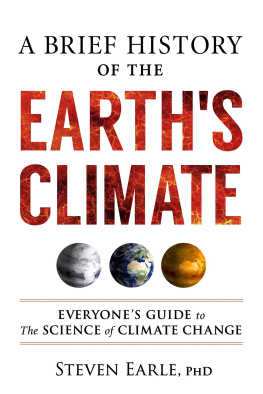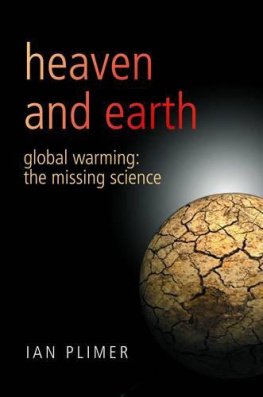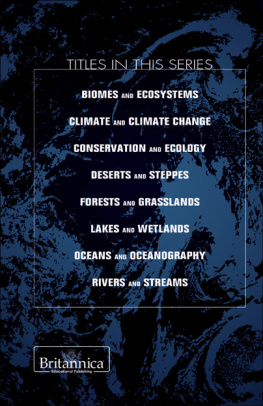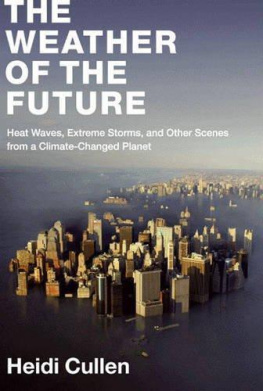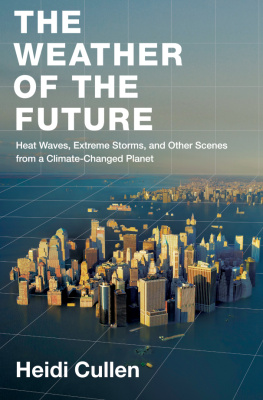
THE
LONG
THAW
The Long Thaw originally appeared in the SCIENCE ESSENTIALS series.
Books in the SCIENCE ESSENTIALS series bring cutting-edge science to a general audience. The series provides the foundation for a better understanding of the scientific and technical advances changing our world. In each volume, a prominent scientistchosen by an advisory board of National Academy of Sciences membersconveys in clear prose the fundamental knowledge underlying a rapidly evolving field of scientific endeavor.
DAVID ARCHER
THE
LONG
THAW
How Humans Are Changing the Next
100,000 Years of Earths Climate
With a new preface by the author
Princeton University Press
Princeton and Oxford
Copyright 2009 by Princeton University Press
New preface 2016 by Princeton University Press
41 William Street, Princeton, New Jersey 08540
In the United Kingdom: Princeton University Press,
6 Oxford Street, Woodstock, Oxfordshire OX20 1TR
press.princeton.edu
All Rights Reserved
Fourth printing, and first paperback printing, 2010
First printing of the Princeton Science Library edition,
with a new preface by the author, 2016
Paperback ISBN: 978-0-691-16906-4
Library of Congress Control Number: 2015959473
British Library Cataloging-in-Publication Data is available
The book has been composed in Minion and Impact
This book is printed on acid-free paper
Printed in the United States of America
1 3 5 7 9 10 8 6 4 2
For my parents and their friends
in the dinner / discussion group
Contents
Preface to the Princeton Science Library Edition
I wrote this book ten years ago because it seemed to me that most people were unaware that their carbon footprints would persist for thousands of lifetimes. To me, every decision I make to burn a gallon of gas rings through an immensity of deep future time. I wrote this book to try to communicate this weird perspective.
Scientific papers had been written, including some of my own, describing in detail the science presented in this book, but it was (and remains) common to see the lifetime of global warming described in terms of centuries. Of course, an event that lasts hundreds of thousands of years could be described as some number of centuries, but it would be like describing New York City as meters away from Chicago; its not wrong but it conveys a wrong impression.
The longevity of our impact on Earths climate gives it a whole new dimension of horror. If it were true that global warming would subside in a hundred years or so, maybe the ice sheets would be able to weather the warm-storm and survive. Arctic sea ice is melting dramatically today, but it would re-form if our warm footprint subsided. The deep ocean takes longer than a century to reach a new temperature, so our heat pollution wouldnt be locked in to the Earth system so strongly, and ocean warming would have a smaller impact on the frozen methane hydrates sleeping deep beneath the sea floor. Sea level might reach a plateau, then stop rising. The geoengineering strategy of solar radiation management (blowing smoke up into the stratosphere to reflect sunlight) would be much more reasonable to consider if we only had to do it for a few hundred years.
Not much has changed in these ten years, except for the time we cant get back. The negotiating target of 2C peak warming seems both physically terrifying and politically unattainable. However, I believe the tide is turning. Alternative energy prices have fallen much faster than anyone predicted, and awareness is growing of the ethical unacceptability of unmitigated climate change. I believe that humankind is evolving ethically, and that it is only a matter of time before burning fossil fuels is recognized as inflicting harm on others and therefore banned. If, hypothetically, we lived on a planet with no more coal, it would not be the end of the world; it would just be a business opportunity. The only hard part is making the decision. And if in the end we have moved too slowly (as we clearly are), it will be a real pain but we can always clean CO2 out of the atmosphere, like cleaning up the worlds largest oil spill.
All is not lost! About half the carbon it would take to get us to the dreaded 2C is still in the ground. As Neil deGrasse Tyson said in his excellent Cosmos episode on climate change, There is a future worth fighting for!
Acknowledgments
T his manuscript benefited from comments by Jeffrey Kiehl, Ingrid Gnerlich, Daniel Yang, and an anonymous reviewer, and by conversations with Ken Caldeira and Andy Ridgwell. I gave many public presentations of these ideas in the course of writing the book, and I was asked a lot of insightful questions. I also get tons of feedback from the readers of the climate science Web site realclimate.org. If you are one of the many people Ive interacted with on these topics, in whichever venue, please accept my thanks.
PROLOGUE
Global Warming in Geologic Time
G lobal warming could be one of humankinds longest lasting legacies. The climatic impacts of releasing fossil fuel CO2 to the atmosphere will last longer than Stonehenge. Longer than time capsules, longer than nuclear waste, far longer than the age of human civilization so far. Each ton of coal that we burn leaves CO2 gas in the atmosphere. The CO2 coming from a quarter of that ton will still be affecting the climate one thousand years from now, at the start of the next millennium. And that is only the beginning.
The excess CO2 in the atmosphere at the next millennium may not be the exact same molecules that came from our power plants. Some of the CO2 from fossil fuels will have been taken up into trees, or deposited in soils. Some will have dissolved in the oceans. But, as this book will explain, the CO2 concentration in the atmosphere at the next millennium will be higher if that coal is burned than if it is not. About 10% of the CO2 from coal will still be affecting the climate in one hundred thousand years.
Over the last few centuries, mankind has been humbled by insights from the scientific enterprise. Darwin told us that humans are not biologically special; we are descended from monkeys, and they from even humbler origins. Copernicus discovered that the Earth is not the center of the universe, but rather revolves around the Sun, an ordinary star like billions of others. Geologists reconstruction of the history of the Earth tells us that the world is much older than we are, and theres no evidence that it was created especially for us. Most of Earth history predates the arrival of humans. This is all very humbling. Global climate is a canvas upon which mankind may be painting one of his longest-lasting legacies. Were not so puny, after all. We are becoming players in geologic time.
The first section of the book is a snapshot of the situation we find ourselves in right now. In geologic time, a century is nothing, an eyeblink, so lets be geological and consider the last century and the next century to be the present. The theory behind global warming has been around for about a century. Meanwhile, the CO2 concentration in the atmosphere has been steadily rising. This was discovered about a half-century ago. Just in the last few decades, the temperature of the atmosphere has begun to rise in a way that can be satisfactorily explained only by the greenhouse theory, which has the implication that it will get even warmer if CO2 continues to rise. The first section of the book contains an explanation of what the forecast calls for, and why.
The second section of the book is about the past. A tenet at the foundation of geology is that the present is the key to the past. The idea is that processes that can be observed today might also be responsible for things that happened in the past, given the vast stretches of geological time. An ice sheet grinds up the rocks into dust, which blows away and deposits someplace else. Eventually, after tens of thousands of years, you have a layer of glacial flour many meters thick.
Next page
